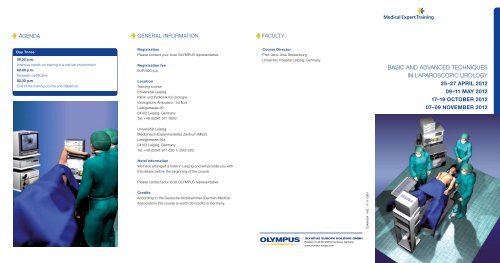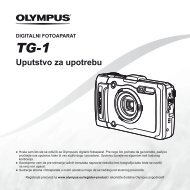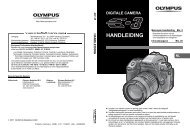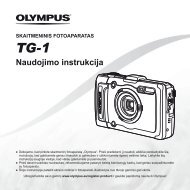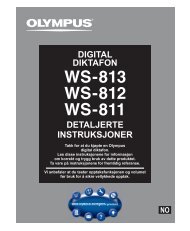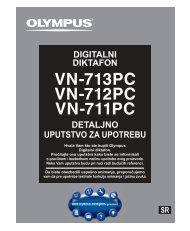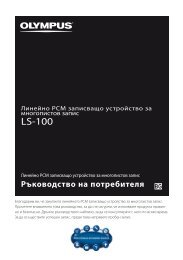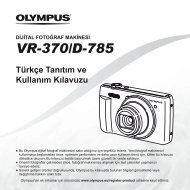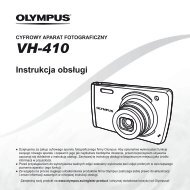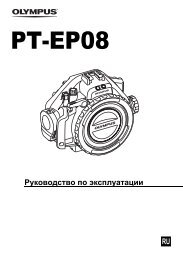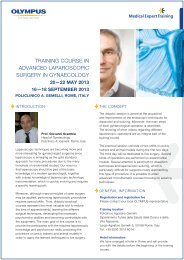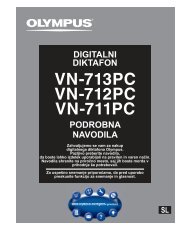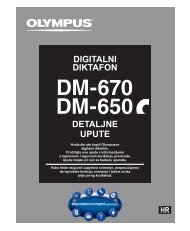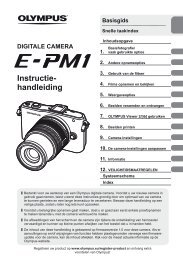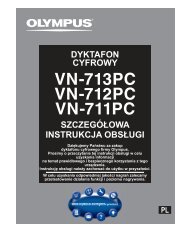basic and advanced techniques in laparoscopic urology - Olympus
basic and advanced techniques in laparoscopic urology - Olympus
basic and advanced techniques in laparoscopic urology - Olympus
Create successful ePaper yourself
Turn your PDF publications into a flip-book with our unique Google optimized e-Paper software.
AGENDA<br />
GENERAL INFORMATION<br />
FACULTY<br />
Day Three<br />
09.00 a.m.<br />
Intensive h<strong>and</strong>s-on tra<strong>in</strong><strong>in</strong>g <strong>in</strong> a wet lab environment<br />
02.00 p.m.<br />
Farewell, certificates<br />
02.30 p.m.<br />
End of the tra<strong>in</strong><strong>in</strong>g course <strong>and</strong> departure<br />
Registration<br />
Please contact your local OLYMPUS representative.<br />
Registration fee<br />
EUR 600 p.p.<br />
Location<br />
Tra<strong>in</strong><strong>in</strong>g course<br />
Universität Leipzig<br />
Kl<strong>in</strong>ik und Polikl<strong>in</strong>ik für Urologie<br />
Urologische Ambulanz, 1st floor<br />
Liebigstrasse 20<br />
04103 Leipzig, Germany<br />
Tel. +49 (0)341 971 7600<br />
Course Director<br />
Prof. Jens-Uwe Stolzenburg<br />
University Hospital Leipzig, Germany<br />
BASIC AND ADVANCED TECHNIQUES<br />
IN LAPAROSCOPIC UROLOGY<br />
25–27 April 2012<br />
09–11 May 2012<br />
17–19 October 2012<br />
07–09 November 2012<br />
Universität Leipzig<br />
Mediz<strong>in</strong>isch Experimentelles Zentrum (MEZ)<br />
Liebigstrasse 26a<br />
04103 Leipzig, Germany<br />
Tel. +49 (0)341 971 620 1/-200/-202<br />
Hotel <strong>in</strong>formation<br />
We have arranged a hotel <strong>in</strong> Leipzig <strong>and</strong> will provide you with<br />
the details before the beg<strong>in</strong>n<strong>in</strong>g of the course.<br />
Please contact your local OLYMPUS representative.<br />
Credits<br />
Accord<strong>in</strong>g to the Deutsche Ärztekammer (German Medical<br />
Association) this course is worth 30 credits <strong>in</strong> Germany.<br />
E0491634 · 400 · 11/11· OEH<br />
Postbox 10 49 08, 20034 Hamburg, Germany<br />
www.olympus-europa.com
INTRODUCTION<br />
THE CONCEPT<br />
AGENDA<br />
Jens-Uwe Stolzenburg, FRCS (Ed)<br />
Professor <strong>and</strong> Chairman, Department of Urology<br />
Head of the International Tra<strong>in</strong><strong>in</strong>g Centre for<br />
Urologic Laparoscopy<br />
University of Leipzig<br />
Department of Urology<br />
Liebigstrasse 20<br />
04103 Leipzig, Germany<br />
Phone: +49 (0)341 971 7600<br />
Fax: +49 (0)341 971 7609<br />
Email: jens-uwe.stolzenburg@unikl<strong>in</strong>ik-leipzig.de<br />
Laparoscopic surgery was <strong>in</strong>itially used as an ablative<br />
tool, especially <strong>in</strong> the treatment of benign diseases.<br />
Technical advances <strong>and</strong> improved surgical skills now<br />
allow it to be applied to malignant diseases <strong>and</strong> cases<br />
that require complex reconstruction. Improvements <strong>in</strong><br />
urologists’ <strong>laparoscopic</strong> skills have paved the way for the<br />
establishment of <strong>laparoscopic</strong> reconstructive <strong>urology</strong> <strong>in</strong><br />
everyday practice.<br />
The technique of nerve-spar<strong>in</strong>g endoscopic extraperitoneal<br />
radical prostatectomy (nsEERPE) has become a st<strong>and</strong>ard<br />
procedure at high-volume centres such as the University<br />
of Leipzig, where more than 3,500 EERPEs have been<br />
performed to date. Based on a modular surgical tra<strong>in</strong><strong>in</strong>g<br />
system, this procedure has been divided <strong>in</strong>to various levels<br />
of complexity. Based on a highly st<strong>and</strong>ardised technique,<br />
this concept offers a short learn<strong>in</strong>g curve <strong>and</strong> makes it<br />
possible to start with this complex procedure as a beg<strong>in</strong>ner<br />
<strong>in</strong> laparoscopy <strong>and</strong>/or without experience <strong>in</strong> open pelvic<br />
surgery.<br />
International tra<strong>in</strong><strong>in</strong>g centre for urologic laparoscopy<br />
In order to ensure optimal quality of surgical practice <strong>in</strong><br />
Germany, the rest of Europe <strong>and</strong> worldwide, it was essential<br />
to create a tra<strong>in</strong><strong>in</strong>g centre for beg<strong>in</strong>ners as well as for<br />
experienced surgeons. The necessity for the creation of<br />
<strong>laparoscopic</strong> courses is obvious, result<strong>in</strong>g <strong>in</strong> a variety of<br />
models developed to tra<strong>in</strong> urologists <strong>in</strong> <strong>basic</strong> <strong>and</strong> <strong>advanced</strong><br />
<strong>laparoscopic</strong> skills with<strong>in</strong> a structured curriculum, <strong>in</strong> a<br />
controlled environment <strong>and</strong> free of the emotional stress of<br />
operat<strong>in</strong>g on real patients. This course provides tra<strong>in</strong><strong>in</strong>g<br />
models that are highly applicable to real life.<br />
This model <strong>in</strong> particular provides a wide range of tra<strong>in</strong><strong>in</strong>g<br />
applications. The anatomy of THE model is comparable to<br />
that of a human be<strong>in</strong>g <strong>and</strong> thus constitutes a very useful ‘liv<strong>in</strong>g<br />
model’ for improv<strong>in</strong>g <strong>laparoscopic</strong> skills. The tra<strong>in</strong>ees can<br />
practise a wide range of procedures <strong>and</strong> deal with the result<strong>in</strong>g<br />
complications <strong>in</strong> vivo. This enables the master<strong>in</strong>g of dissection<br />
<strong>and</strong> haemostatic <strong>techniques</strong> <strong>in</strong> pulsat<strong>in</strong>g tissue. A dry lab could<br />
never offer tra<strong>in</strong><strong>in</strong>g <strong>in</strong> conditions so close to reality.<br />
Basic <strong>techniques</strong> focused on <strong>laparoscopic</strong><br />
prostatectomy (<strong>basic</strong> <strong>and</strong> <strong>in</strong>termediate level)<br />
· Dissection <strong>techniques</strong><br />
· Lymphadenectomy<br />
· Nephrectomy<br />
· Sutur<strong>in</strong>g <strong>techniques</strong><br />
· And others<br />
All tra<strong>in</strong><strong>in</strong>g courses focus on practical learn<strong>in</strong>g under the<br />
supervision of experts. No more than n<strong>in</strong>e participants will<br />
take part <strong>in</strong> each course. This allows for <strong>in</strong>tensive tra<strong>in</strong><strong>in</strong>g<br />
at the wet lab over two days. The tasks with<strong>in</strong> the tra<strong>in</strong><strong>in</strong>g<br />
model vary <strong>in</strong> difficulty so as to cater for the differ<strong>in</strong>g levels of<br />
experience among the surgeons.<br />
Advanced <strong>techniques</strong> focused on <strong>laparoscopic</strong><br />
prostatectomy (<strong>advanced</strong> level)<br />
· Sutur<strong>in</strong>g <strong>techniques</strong><br />
· Lymphadenectomy <strong>and</strong> prostatectomy<br />
· Cystectomy<br />
· Nephrectomy<br />
· Pyeloplasty<br />
· And others<br />
The course deals with <strong>laparoscopic</strong> <strong>techniques</strong> applied to<br />
the complexities of radical prostatectomy <strong>and</strong> cystectomy. It<br />
<strong>in</strong>cludes practical <strong>in</strong>struction, operations on live pigs under the<br />
direction of the course faculty <strong>and</strong> live <strong>in</strong>teractive sessions.<br />
This <strong>in</strong>tensive course is designed for urologists who already<br />
have experience <strong>in</strong> laparoscopy.<br />
Day One<br />
11.00 a.m.<br />
Welcome <strong>and</strong> <strong>in</strong>troduction<br />
11.15 a.m.<br />
Introduction on the environment used <strong>in</strong><br />
<strong>laparoscopic</strong> surgery<br />
12.00 p.m.<br />
Intensive h<strong>and</strong>s-on tra<strong>in</strong><strong>in</strong>g <strong>in</strong> a wet lab environment<br />
05.00 p.m.<br />
Conclud<strong>in</strong>g discussion<br />
05.15 p.m.<br />
End of day one<br />
Day Two<br />
08.15 a.m.<br />
Live operation 1: radical prostatectomy<br />
11.00 a.m.<br />
Lecture <strong>and</strong> lunch<br />
12.30 p.m.<br />
Live operation 2: radical prostatectomy<br />
02.30 p.m.<br />
End of operation<br />
03.00 p.m.<br />
End of day two


